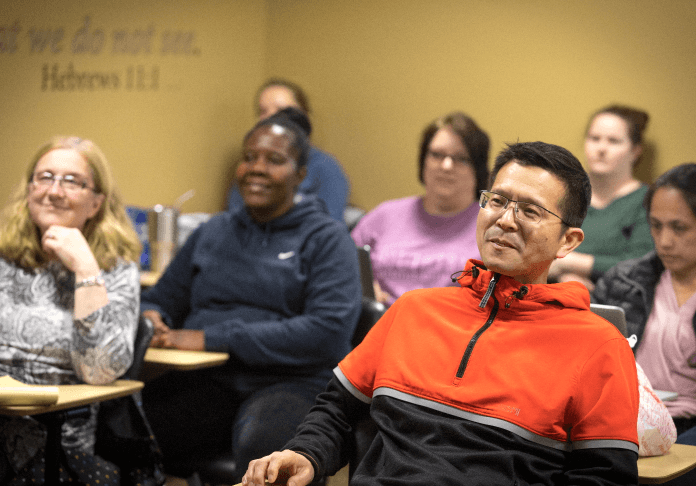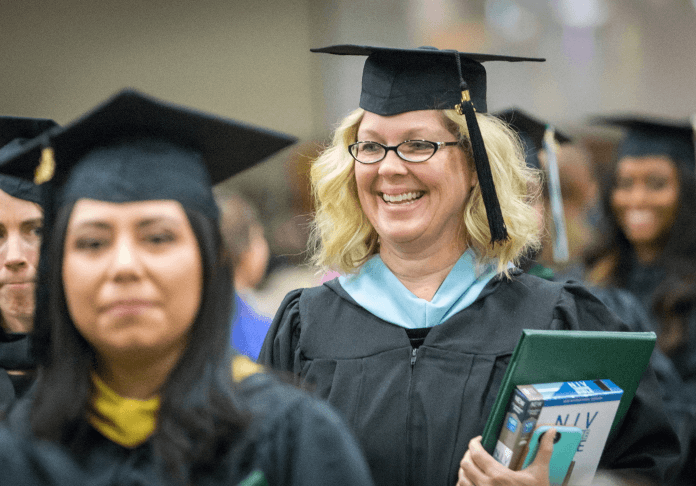In fact,
only 41% of students
finish their bachelor’s degree in 4 years
Everything you need to know about degree completion programs: who they’re designed for, how long they take to complete, how to finance your degree, how to complete your degree online, and how to know which program is right for you.

First of all, congratulations on taking the first step toward finishing your degree.
If this is something you’ve been thinking about and you want to learn more about how adult degree completion programs work, you’ve come to the right place.
Going back to school is a challenging journey to take, but so rewarding—and much more common than you might think.
Here are a few more stats that may surprise you:
Before we get into all the nuances of adult degree completion (ADC) programs, how financial aid works, and how to find the right program for you, let’s first talk about what an ADC program actually is and how it works.
Adult degree completion programs are designed to help adults who are interested in returning to school to finish their bachelor’s degree. Whether it’s been two years or twenty, these programs help adult learners cross the finish line and accomplish their academic goals.
Because these programs are built for working adults, they’re set up to be flexible, affordable, and accessible to everyone. Even those who are working full-time or balancing their personal and professional responsibilities can build a roadmap to finish their degree. In fact, the majority of ADC students fit that description!
You’ve also got to consider whether you want to take classes on a full-time or part-time basis. If you’re able to be a full-time student and take three or four classes at a time, your road to graduation might be a lot quicker than someone who is only able to take one.
Schools will work with you to review which credits you’ve previously earned that can be applied to their ADC program and which courses you’ll need in order to graduate. Wherever you are in your academic journey and whatever your goals are, they’ll help build a plan that gets you where you need to go.

Financing your education ultimately comes down to one thing: it’s a significant investment—but one that’s absolutely worth it.
If you’re thinking about returning to school and have questions about how you’re going to finance your degree, then you’ve come to the right place. There are a number of scholarships, grants, tax credits, and other forms of financial aid available for students like you.

Submit the Free Application for Federal Financial Aid (FAFSA)
Click to read more
If you’re returning to school and looking for scholarships, grants, and other financial aid to help reduce the cost, then FAFSA is the place to start. The Free Application for Federal Financial Aid is the universal entryway for many federal grants and scholarship opportunities and will be the place where you’ll find ways to finance your degree.
.png?width=435&height=280&name=ryan-hoffman-v7Jja2ChN6s-unsplash%20(1).png)
Applying for the Federal Pell Grant
Click to read more
Through the FAFSA application, you’ll see federal grants and scholarships for which you may be qualified, including the Federal Pell Grant.
Federal Pell Grants are typically awarded to students who display exceptional financial need and have not yet earned their college degrees. Grants like these usually don’t have to be repaid, though there are exceptions to the rule.
If you meet the requirements, the Pell Grant can be a welcome financial relief program and one you should absolutely consider.

Apply for Scholarships for Nontraditional Students
Click to read more
One of the benefits of being a working adult who’s returning to school is that there are several financial aid programs specifically designed for returning students like you.
That’s where the term “nontraditional students” comes from—which, in this case, typically skews to an older student audience who started school but has not yet earned their degree.
University and government programs both understand the unique challenges that nontraditional students will face as well as the importance of helping people finish their degrees. If this sounds like you, then you may be eligible for scholarships for nontraditional students.
Take Advantage of Tax Breaks for College Students
In addition to scholarships, grants, and other financial aid, you should be taking advantage of tax breaks for college students and their families that offer significant financial incentives.
They work differently from other forms of financial aid because you’ll have to pay tuition and expenses up front, but when you submit your taxes you can receive credits if you’re eligible. Read up on each credit for more information and consult your accountant for applying those credits to your tax returns.

The American Opportunity Tax Credit (AOTC)
Click to read more
The American Opportunity Tax Credit (AOTC) is a credit for qualified education expenses paid for the first four years of college.
To be eligible for AOTC, you must be attending an accredited institution, be enrolled at least half the time for the academic period, and not have finished your degree at the beginning of the tax year. Read the full list of requirements.
You can receive up to $2,500 per eligible student. If the credit brings the amount of tax you owe to zero, you can have 40 percent of any remaining amount of the credit (up to $1,000) refunded to you.
There are tax implications to consider when filing for the AOTC, which include various tax forms and strict eligibility requirements. Consider working with a qualified accountant to make sure you are considering all options.
.png?width=435&height=280&name=ryan-hoffman-v7Jja2ChN6s-unsplash%20(1).png)
Lifetime Learning Tax Credit
Click to read more
The Lifetime Learning Credit is for qualified tuition and related expenses paid for eligible students enrolled in undergraduate, graduate, and professional degree programs.
To be eligible, you must have paid qualified education expenses for college, be enrolled in an accredited program, and be listed on your tax return.
Am I Eligible to Claim an Education Credit?
One of the best things about the Lifetime Learning Credit is that there is no limit on the number of years you can claim the credit. It is worth up to $2,000 per tax return.
Like with the AOTC, there are tax implications to consider when claiming this credit. Read the eligibility requirements thoroughly and work with an experienced accountant.

Military Scholarships and Discounts
Click to read more
If you served or are currently serving in the Armed Forces, you may be eligible for scholarships, grants, and other forms of military financial aid. You can read more about them in our blog, Military Scholarships, Grants, and Financial Aid for Veterans and Active Service Members.

Credit for Prior Learning
Click to read more
One way that schools grant credit for prior experiences is called Credit for Prior Learning (CPL). Through this assessment system, universities can offer college credit for past work experience, military service, or academic programs. It’s a process that takes some work and communication between you and your university, but the payoff of spending less time in school and less money on tuition can be worth it.
Here are the four main ways you can earn CPL:
For the full run-down on CPL, from helpful explanations to the steps to earning CPL at Southern, download the CPL Toolkit.

Work With Your Admissions Counselors
Click to read more
There are a lot of financial aid and tuition assistance programs available and we’ve only touched on a few of them. It can be time-consuming to do the research and to keep track of all of the eligibility requirements and deadlines.
That’s why we recommend working with an admissions counselor from your program of interest. It’s the best way to understand your unique situation and to get a sense of which financial aid programs you are most likely to qualify for—many of which you may not even have been aware of.
We invite you to connect with the director of Southern’s Adult Degree Completion program. Our flexible programs have been designed for working adults like you who want to finish school without putting their lives on hold.

The benefits of going back to school to complete your degree are substantial.
Statistically speaking, finishing your degree will typically help you get a raise or promotion, enable you to pursue a new career that you aren’t currently qualified for, or reach other meaningful achievements, such as creating a better work/life balance so you can spend more time with your family.
That said, finishing your degree can be a rigorous journey that requires a commitment of time, energy, and resources.
For that reason, each person must decide for themselves if earning their degree is the right path for them.
Everyone has different motivations for enrolling in an ADC program. You might be earning your degree so you can earn a specific promotion, whereas your classmate might be a retired person who’s doing this for personal fulfillment.
If you’re not sure how to answer some of these questions, it can be very helpful to speak with an admissions counselor who can guide you through the decision-making process and help you chart the best path forward.

Here at Southern Adventist University, we are very proud that our ADC program is designed to help students achieve their academic goals and finish what they started—even if it was 20 years ago.
Based in Chattanooga, Tennessee, we offer flexible, affordable, and accessible degree options across a variety of programs. Our students come from all over to complete their degrees at a private, faith-based institution that offers public school prices.
Southern faculty really embrace the class and want you to be better in your profession. They are led by the spirit and have a true gift of encouraging others to seek more of themselves.
Patricia Griffith, ADC student
We encourage you to explore these programs, their course offerings, and see how they might help you accomplish your goals. Our degree completion programs include:
Take the Next Step: A Re-Entry Guide to Finishing Your Degree
Financing Your Degree: A Guide to Helping Working Adults Afford Their Degree Completion Program
Advance Your Nursing Career with an RN to BSN Program